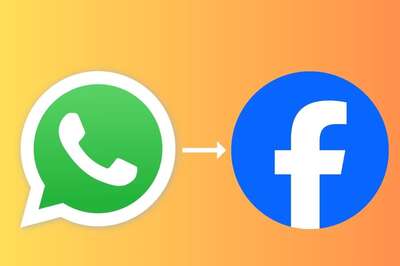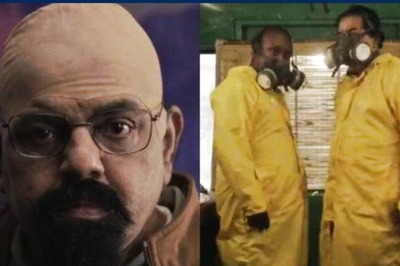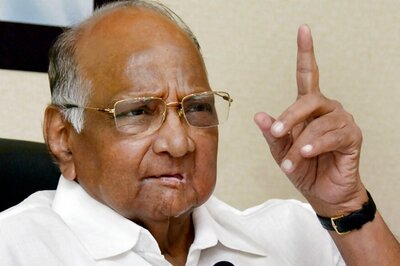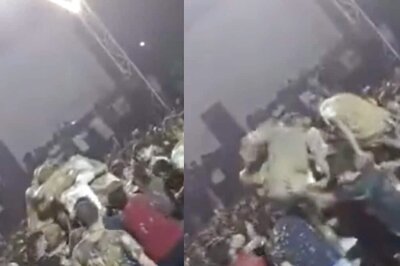The Way Nation Responded to PM's Call Twice During Coronavirus Crisis Reveals People's Love for Modi

views
The way the country responded to Prime Minister Narendra Modi’s call twice -- once on March 22 and then again on April 5 -- shows he has emerged as the most-loved leader of the country.
The test of popularity is when people trust you in hours of adversity. Not all prime ministers get this kind of adulation. This is truly a defining moment for the BJP at its 40th foundation day on Monday as this would inspire party workers to rededicate themselves to the cause of nation-building.
It is proved that people are not cynical and they want to give full backing to Modi to fight the pandemic. Getting locked down for 21 days is no easy task.
Critics have gone to town saying the economy is suffering and the country is increasing its debt burden. But the prime minister and his team are singularly concerned about saving lives. Economy would not make any sense to any family that would lose its members to the coronavirus (COVID-19).
Critics ridiculed the PM and said he should talk about the measures taken to tackle the pandemic rather than asking people to do such things as clapping and lighting of lamps.
But people seemed to be lauding the efforts made by the prime minister and his team. While the opposition Congress and others suggested there was a delay in the lockdown, World Health Organisation (WHO) Chief Tedros Adhanom Ghebreyesus lauded Modi for timely declaration of the lockdown and for providing help to the poor and needy.
Hence, when the PM gave a call for thanking medics and paramedic staff for their selfless service even at the cost of risk to their lives, people came out in large numbers on March 22 at 5pm and clapped and beat up utensils or blew conch shells.
In their enthusiasm, some people came on the streets and started celebrating as if they had won the coronavirus battle. In fact, everybody’s heat beat up fast when they realised the entire country was working in unison. When 130 crore people speak in one voice such emotions are bound to overflow.
Midway into the lockdown, when Modi gave a call to light a lamp or candle or just switch on the flashlight of mobile phones, critics again showed their cynicism.
Nine minutes at 9pm on April 5. Why this specific instruction no one knew. The prime minister had rightly understood that boredom must have set in and people’s resolve to fight must not get weakened.
The exercise was precisely to realise the inner strength. The critics went to town questioning the timing and the call.
The results were astounding. The entire country seemed to be one with the call. It appeared that the entire country had decided to celebrate Diwali (the festival of light).
The critics were shown their place and entire India was with Modi. One got emotionally charged throughout those nine minutes seeing everyone in their balconies or doors performing the task. This showed the nation’s resolve to fight and the resolve to be united.
The two events forced me to analyse if similar things happened earlier where the prime minister was loved like this. The second prime minister of India, Lal Bahadur Shastri, who had asserted the importance of ethics and morality in politics, had got a similar response during the India-Pakistan war of 1964 when he called upon people to skip at least one meal a week.
At the time, India was facing food shortage and the US had threatened to cut off all food supplies. Before giving this call, Shastri had experimented by asking family members not to cook evening meal for a week. Although he served as a PM for a short duration (June 9, 1964 –January 11, 1966), he left an indelible mark.
Shastri upheld very high standards in politics and had resigned as railway minister on moral grounds in 1956 after 150 people died in a train accident near Ariyalur in Tamil Nadu.
Another example was Mahatma Gandhi. Before he joined the Congress, the platform was a mere forum for discussing Indian issues and working through petitions and so on. It had become elitist.
Gandhi made the Congress a mass movement through complete identification of his own lifestyle with those of the masses. The real strength of India was felt during the Non-cooperation Movement of 1920-22.
Gandhi wanted the agitation to be fully non-violent and had promised ‘swaraj’ (self rule) within a year if non-cooperation was followed strictly.
But he had warned against violence. When the agitation became violent, he called it off saying countrymen were not fully prepared for self rule.
Many Congress leaders, including Pandit Jawaharlal Nehru, disagreed but had to toe the line. Gandhi showed the test of success to people during the Dandi March in 1930 and prepared the country for the final onslaught during the Quit India Movement in 1942.
It is important for leaders to prepare the mind of people for the task ahead. Very few Congress leaders had this quality.
Nehru as the first PM of independent India was a popular leader, but he did not have the same sway over the masses. His daughter Indira Gandhi was a very powerful leader who split Pakistan into two.
However, when she imposed the Emergency, she faced the wrath of the people and had to lose power. She could not convince people about the rationale behing the imposition of Emergency.
Another very popular BJP leader, late Atal Behari Vajpayee, had a magical hold on people. Even if he did not win as massive a majority for the BJP as Modi, people loved him and never doubted his integrity and commitment to the country.
When India tested its nuclear power May 11, 1998, he had defied the most powerful players in the world and knew very well that India would pass through a tough phase. By the strength and determination of the people, India braved the sanctions.
We have seen how the various calls for Bharat Bandh by opposition leaders have not got the same connect. Opposition-ruled states have to use their might of state to impose the bandh, like in West Bengal.
But most people kept away because they believed that the reasons were not genuine and that the prime minister was trying his best to find solutions to the issues facing the country.
What endears the prime minister to his countrymen is his integrity and sincerity. Modi has emerged as the guardian of one and all and has been taking care of all sections of society.
Tears rolled down when I heard the story of some rickshaw pullers halting wherever they were at 9pm and lighting the flashlight of their mobile to support their leader.




















Comments
0 comment